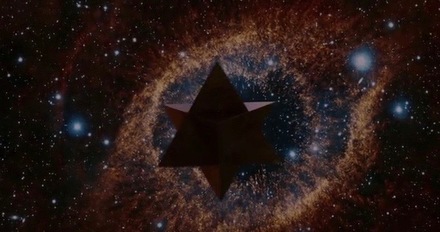Feeling hostile? Listening to a lot of Morbid Angel?
Death metal is a reliable anger vent, but since the Florida groundbreakers, led by guitar twister Trey Azagthoth, played L.A. this week, let's consult him as an entry point.
When you're chronically mad, the first question is whom to hate. An idiot driver who nearly killed you? Too insignificant. A president? Too unimaginative. A family member? Too inconvenient. So death metal's main scapegoat is Judeo-Xtianity, appropriate for its establishment status, its brutality and its hypocrisy.
As Azagthoth complains in "World of Sh*t (The Promised Land)," from Morbid Angel's classic 1993 album "Covenant," a "doctrine of lies" has led us to a promised land "bred from the bowels" via a false son-savior he calls "God's holy f*ck." For a worship alternative, Azagthoth offers the Ancient Ones, the pagan gods of Mesopotamia, who may have their own issues with war and slaughter, but at least they're upfront about it.
Lyrics about the Rapture, the Beast, the lions' den, the Ancient of Days and many other biblical signposts reveal Azagthoth's personal obsession with the religious tradition that betrayed him/us. Mr. A also references pre-existent pagan myths adopted for Our Book: flood, Watchers, council of heaven, dying/rising gods. The similarities suggest the real problem with paganism is that it never went away; Xtianity (especially Catholicism), with its polytheistic host of saint-gods and idols, just slapped a new coat of gold paint on it. Azagthoth might not have taken so much issue with a certain J. Naz if that prophet's teachings about love, humility and poverty had received greater emphasis in the cathedrals and palaces that claimed to represent him.
So the Morbid Angel worldview exhibits some internal dissonance, represented nicely in Egyptian-American metal conceptualist Nader Sadek's new video for Morbid Angel's "Garden of Disdain," a sludgy workout from the album "Kingdoms Disdained" (released last December 1 as a timely Xmas gift). In it, a grisly horned god travels to Earth in a spacecraft shaped like a Star of David, hatching a brood of white-robed children who both gnaw his flesh and serve as his own sacrificial victims; having seeded our planet, he moves on.
The mixture of Jewish, Xtian and pagan images, despite introductory titles referencing the virtues of ancient Sumeria, suggest that all Western religions do indeed derive from the same source, and that the source is evil. This notion conflicts with Morbid Angel's belief in venerable pre-Xtian gods, and with the statement of the song's divine narrator that he is "disgusted by your petty life," a life that has strayed from his guidance and the original Garden he provided. Azagthoth's real villain is not god but man, and man's corrupt religion.
Entering his mid-50s, Azagthoth seems aware of his mythology's limitations, and strives to blur the cartoonish boundaries of metal -- Morbid Angel's 2015 live album (recorded in 1989) is even titled "Juvenilia." He surely knows that his most potent tool, most recently epitomized on the "Kingdoms" track "The Pillars Crumbling," remains his spontaneously abstract, mysterious and layered guitar work. Perhaps Azagthoth doesn't even mind that the drummer from Morbid Angel's most famous period has become a Xtian.

